Source: The Conversation (Au and NZ) – By Ari Mattes, Lecturer in Communications and Media, University of Notre Dame Australia
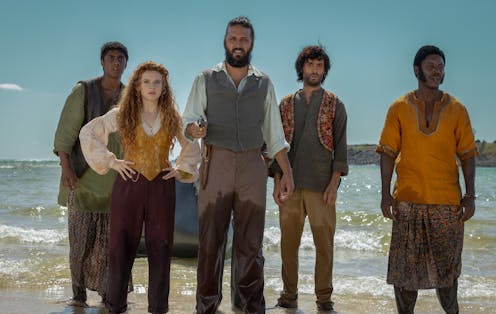
Investing in film and TV productions is a risky venture. Even the best directors and producers are just a flop away from ruining their careers.
So if a company owns the intellectual property to a popular material, or if that material enters the public domain, these companies – risk-averse entities, to be sure – will hastily retread their tyres for another lap of the track. This is partly why you’ll see well-worn stories from your childhood told over and over onscreen, even now.
But if the new version is too similar to the old, people will cynically roll their eyes. Enter Disney, which has perfected the strategy over the past few decades of retelling the same stories from different characters’ perspectives – a gambit that seems to strike people as inherently interesting.
Maleficent, for example, is Sleeping Beauty from the perspective of the evil queen. Although this kind of fairytale revisionism goes back to Angela Carter’s best-selling feminist fiction, Disney has, more than any other corporation, become an expert at co-opting social movements in pursuit of profits.
The latest revisionist work set to be distributed by Disney+ was Nautilus. The series filters the story of Jules Verne’s inimitable maritime adventure novel 20,000 Leagues Under the Sea through the lens of Captain Nemo, framed as a prequel to the original.
The fact that Disney+ dropped Nautilus before its release (it has been picked up by Prime in the UK and Ireland and Stan in Australia) immediately stoked my interest. This is particularly notable because, with a budget of A$300 million, it’s the most expensive series ever made in Australia (filmed mainly on the Gold Coast).
Alas, after restlessly sitting through all ten episodes, I understand Disney’s decision.
Diluting a powerful message
Where Verne’s novel (and to a lesser extent, the 1954 Disney live action film) effortlessly creates an authentic world, which is absolutely critical to the effectiveness of any fantasy work, Nautilus seems painfully contrived from its opening.
It’s the kind of show where all the British soldiers and East India Company men speak in toffee accents and spout horrifically ruthless commands between sips of tea.
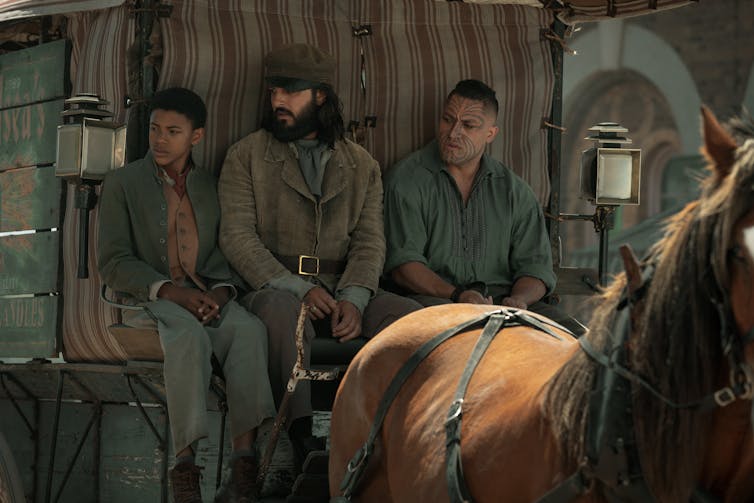
Stan
The Nautilus’ crew is made up of a miscellany of virtuous victims of the company (and thus of the British empire): a wealthy British woman being forced into an arranged marriage, an old Chinese worker, a Māori cook, a trader from Zanzibar and ex‑slave Indians.
The characters frequently pontificate about the value of freedom, the evils of slavery and the glory of the environment. In one particularly ludicrous scene early on, Nemo jumps onto a whale’s back to remove a harpoon.
In the novel, Nemo’s romantic alienation perfectly complements his maniacal drive, interspersed with Verne’s faux-scientific descriptions of the submarine, giant squid and other objects.
Similarly, here, Nemo is presented as being far from mercenary; hounded to the north seas by the British, he’s seeking treasure in order to bring the company down. But lead Shazad Latif’s delivery is monotonous and strained, as though even he doesn’t buy it.
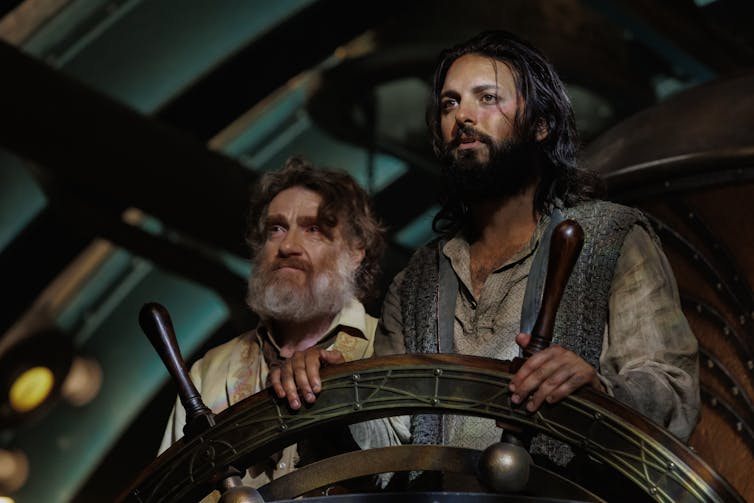
Stan
The idea that this is some kind of “fresh” (read “politically correct”) re‑imagining of the world of the novel is strange in the first place, given the original story (although narrated by Professor Aronnax) is already closely anchored to Nemo’s point of view.
Verne clearly presents Nemo as a kind of eco-warrior responding to the brutalities of colonialism. If anything, the original message is diluted in this adaptation as it implies Nemo’s quest is mainly personal – that he simply wants vengeance for what the company did to his family – rather than political.
At the same time, I sense the creators are going for some kind of psychological realism by painfully spelling out that Nemo had bad things done to him by the British. But this didacticism causes the spirit of adventure to suffer, so we’re left with something both silly and not particularly exciting.
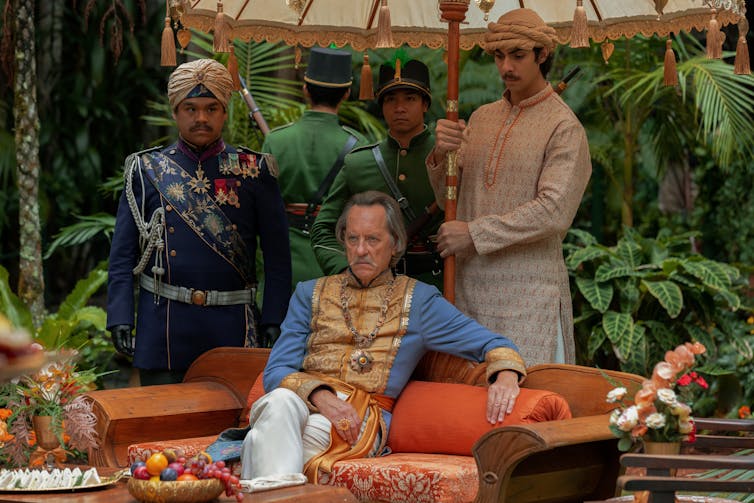
Stan
A big fish isn’t always a good fish
The show’s production design and cinematography (some of the most important components in this kind of adventure epic) seem flat, too. The sets, though colourful, look decidedly artificial. The synthesis of CGI elements with filmed footage is far from smooth.
And the odd colour grade makes the characters’ skin look hyper-artificial. This was surely the intention, but why? It is distracting in every closeup.
Not to single out any particular department, every aspect of the production seems dialled in, including the score, which sounds like something hastily composed using AI software.
Of course, one could talk about the production’s benefits to the Australian industry, but this seems like a hapless argument if the work is no good. How many low-budget films could have been made with $300 million? 100? 150? Those would have also invested money in the industry, while developing local talent.
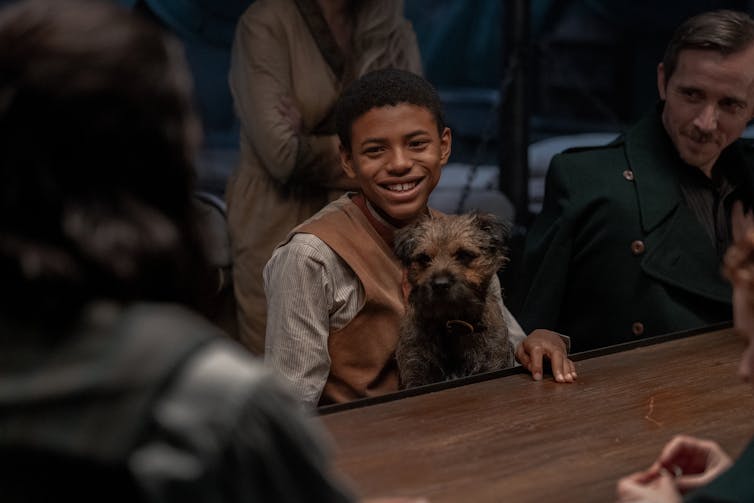
Stan
Not camp enough, yet not careful enough
If it were camper, Nautilus could have acquired the cult value of a great cinematic fiasco such as Renny Harlin’s 1995 film Cutthroat Island. All the actors seem to be trying hard, and the writers clearly laboured away at the story.
Perhaps this is the problem. Like so many new commercial works, Nautilus tries so hard to please everyone it ends up pleasing no one. The wider the appeal, the greater the risk mitigation, apparently.
But given it actually tries to embed the story in a sense of history, its sins seem greater than mere televisual boredom for the viewer. The series presents a monolithic and simplistic image of the way colonialism and capitalism are intertwined.
At best, this is naïve – one could argue, “who cares, it’s just a silly fantasy series”. At worst, however, it is actively destructive of historical consciousness. And that’s not smooth sailing.
![]()
Ari Mattes does not work for, consult, own shares in or receive funding from any company or organisation that would benefit from this article, and has disclosed no relevant affiliations beyond their academic appointment.
– ref. At $300m, Jules Verne-inspired Nautilus is the most expensive Australian-made show. But Disney+ was right to dump it – https://theconversation.com/at-300m-jules-verne-inspired-nautilus-is-the-most-expensive-australian-made-show-but-disney-was-right-to-dump-it-241583




